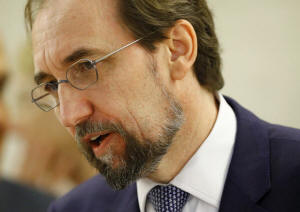|
U.N. rights boss sees possible 'crimes
against humanity' in Venezuela
 Send a link to a friend
Send a link to a friend
 [September 11, 2017]
By Stephanie Nebehay [September 11, 2017]
By Stephanie Nebehay
GENEVA (Reuters) - The United Nations human
rights chief said on Monday that Venezuelan security forces may have
committed crimes against humanity against protesters and called for an
international investigation.
But Venezuela's foreign minister defended the record of the government
of President Nicolas Maduro, rejecting the allegations as "baseless" and
declaring that his country was "back on the path of the rule of law".
Venezuela has been convulsed by months of demonstrations against the
leftist president who critics say has plunged the oil-rich country into
the worst economic crisis in its history and is turning it into a
dictatorship.
"There is a very real danger that tensions will further escalate, with
the government crushing democratic institutions and critical voices,"
Zeid Ra'ad al Hussein told the U.N. Human Rights Council.

The government was using criminal proceedings against opposition
leaders, arbitrary detentions, excessive use of force and ill-treatment
of detainees, which in some cases amounted to torture, he said.
Last month, Zeid's office said that Venezuela's security forces had
committed extensive and apparently deliberate human rights violations in
crushing anti-government protests and that democracy was "barely alive".
"My investigation suggests the possibility that crimes against humanity
may have been committed, which can only be confirmed by a subsequent
criminal investigation," Zeid said on Monday.
INVESTIGATION
"I also urge this Council to establish an international investigation
into the human rights violations in Venezuela," he added.
The opposition, which boycotted the elections for the Constituent
Assembly, has accused electoral authorities of inflating turn-out
figures for the July 30 vote.
[to top of second column] |

Zeid Ra'ad Al Hussein, U.N. High Commissioner for Human Rights
arrives at the 36th Session of the Human Rights Council at the
United Nations in Geneva, Switzerland September 11, 2017.
REUTERS/Denis Balibouse

"We have now selected the National Constituent Assembly, this is the
true expression of our citizens' will. It will have the powers to
draw up a new Constitution," Foreign Minister Jorge Arreaza told the
Geneva forum.
"Venezuela is back on the path of rule of law and democracy, we will
see dialogue emerging thanks to mediation of our friends," he added.
Arreaza accused protesters of using firearms and "home-made weapons"
against security forces, but noted that the last death was on July
30. "Our country is now at peace," he added.
Venezuela is among the 47 members of the Council, where it enjoys
strong support from Cuba, Iran and other states.
In a joint statement, more than 100 Venezuelan, Latin American, and
international rights groups including the New York-based Human
Rights Watch, urged the Council to "address Venezuela’s deepening
human rights and humanitarian crisis" by establishing an
international inquiry.
(Editing by Tom Miles)
[© 2017 Thomson Reuters. All rights
reserved.]
Copyright 2017 Reuters. All rights reserved. This material may not be published,
broadcast, rewritten or redistributed.
 |